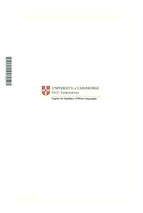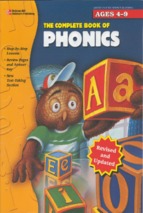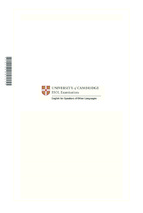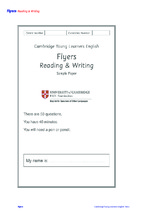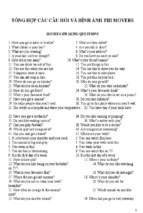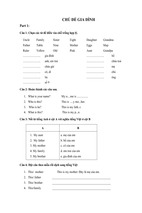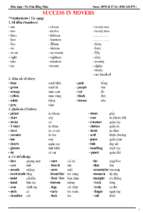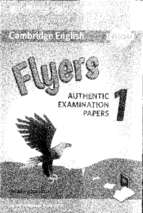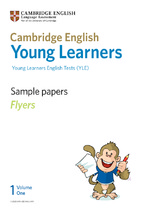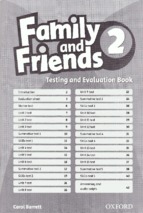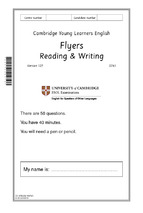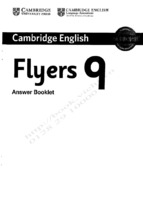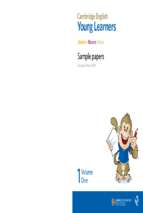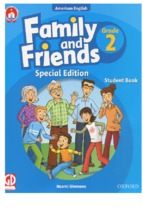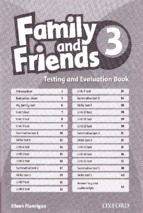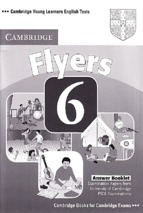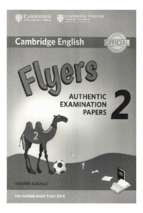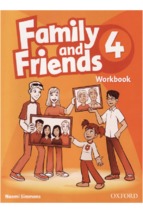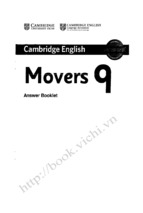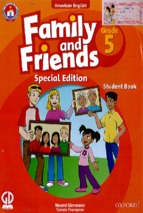FREE SAMPLE COpy
NOT FOR SALE
rcl'NEW EDITIONS
English Language Teaching
Page
Lesson
Contents of Student's Book
Introduction
Meet the Shooting Stars
1
4
5
The Natural World
Family life
Problems
My cool cousin
Animal friends
Real friends
Review 1
The Shooting Stars Episode 1
10
12
14
16
18
21
22
23
24
25
20
22
Review 5
The Shooting Stars Episode 5
Education
Hot and cold places
In the garden
Bugs
Dangers of the sea
On the farm
26
27
28
29
30
Review 2
The Shooting Stars Episode 2
34
36
Review 6
The Shooting Stars Episode 6
11
12
13
14
15
38
40
42
44
46
31
32
33
34
35
Schools in the past
First day
Lessons outdoors
Unusual lessons
Learning languages
48
50
Review 7
The Shooting Stars Episode 7
A new home
Haunted houses
Swapping homes
Useful appliances
Moving house
Review 3
The Shooting Stars Episode 3
76 ~
78
Television
What's your hobby?
Fashion
Joining clubs
Keep fit!
How to be healthy
Sickness and health
At the gym
Accidents happen!
Look after yourself
80
82
84
86
88
90
92
94
96
98
100
102
104
106
Travel and Holidays
Towns and Cities
16
17
18
19
20
66
68
70
72
74
Free Time
24
26
28
30
32
6
7
8
9
10
Page
4
6
8
Family and Friends
2
3
Lesson
A day in London
Working in the city
Town helpers
Town facilities
Old cities
Review 4
The Shooting Stars Episode 4
36
37
38
39
40
62
64
Review 8
The Shooting Stars Episode 8
Notes on plays
122
Tapescripts
124
Key to Super Star 1 Workbook
128
Key to Super Star 1 Test Book
137
Key to extra activities for early finishers
139
Key to photocopiable
141
material for Star Words
Going on holiday
Family holidays
Horrible hotels!
The best way to travel
Summer holiday fun!
52
54
56
58
60
Extra activities for early finishers
142
Photocopiable
material for Star Words
152
Photocopiable
material for plays
156
108
110
112
114
116
Page
Lesson
4
Meet the Shooting Stars
Family and Friends
1
Family life
2
Problems
3
My cool cousin
4
Animal friends
5
Real friends
Grammar:
Vocabulary:
Grammar:
Vocabulary:
Grammar:
Vocabulary:
Grammar:
Vocabulary:
Grammar:
Vocabulary:
present simple
family members, matching verbs and nouns
present continuous
relationship-related words, opposites
present simple and present continuous
adjectives, matching statements and responses
stative verbs
relationship-related words, synonyms
past simple
odd one out, confusing words
6
8
10
12
14
16
18
Review 1 (Lessons 1-5) & Writing 1
The Shooting Stars Episode 1
Education
6
Schools in the past
7
First day
8
Lessons outdoors
9
Unusual lessons
10
Learning languages
Grammar:
Vocabulary:
Grammar:
Vocabulary:
Grammar:
Vocabulary:
Grammar:
Vocabulary:
Grammar:
Vocabulary:
used to
word groups
past continuous
phrasal verbs, school-related words
past simple and past continuous
study-related words
present perfect simple - affirmative
adjectives
present perfect simple - negative, question, short answers
odd one out
Review 2 (Lessons 6-10) & Writing 2
The Shooting Stars Episode 2
I ••
20
22
24
26
28
30
32
11[=
11
A new home
12
Haunted houses
13
Swapping homes
14
Useful appliances
15
Moving house
Grammar:
Vocabulary:
Grammar:
Vocabulary:
Grammar:
Vocabulary:
Grammar:
Vocabulary:
Grammar:
Vocabulary:
past simple and present perfect simple, have been and have gone
confusing words
future simple
home-related words, text-related words
present continuous (with future meaning), be going to
confusing words
can / could (ability), be able to
word groups
can / could (permission and request)
text-related words, phrasal verbs
Review 3 (Lessons 11-15) & Writing 3
The Shooting Stars Episode 3
34
36
38
40
42
44
46
Towns and Cities
16
A day in London
17
Working in the city
18
Town helpers
19
Town facilities
20
Old cities
Review 4 (Lessons 16-20) & Writing 4
The Shooting Stars Episode 4
Grammar:
Vocabulary:
Grammar:
Vocabulary:
Grammar:
Vocabulary:
Grammar:
Vocabulary:
Grammar:
Vocabulary:
must
town-related words, confusing words
have to
town-related words, text-related verbs
mustn't and don't have to
odd one out, confusing words
relative clauses
town-related words, people
countable and uncountable nouns
archaeology-related words
48
50
52
54
56
58
60
Lesson
Page
The Natural World
21
Hot and cold places
22
In the garden
23
Bugs
24
Dangers of the sea
25
On the farm
Grammar:
Vocabulary:
Grammar:
Vocabulary:
Grammar:
Vocabulary:
Grammar:
Vocabulary:
Grammar:
Vocabulary:
articles
odd one out
both, either, neither, all and none of
garden-related words
too much, too many and not enough
insects, adjectives
past perfect simple, so and because
sea-related words
past perfect simple with past simple
farm-related words, matching verbs and nouns
Review 5 (Lessons 21-25) & Writing 5
The Shooting Stars Episode 5
62
64
66
68
70
72
74
Free Time
26
Television
27
What's your hobby?
28
Fashion
29
Joining clubs
30
Keep fit!
Grammar:
Vocabulary:
Grammar:
Vocabulary:
Grammar:
Vocabulary:
Grammar:
Vocabulary:
Grammar:
Vocabulary:
question tags
television-related words, text-related words
question words
odd one out, phrasal verbs
sUb~ectand object questions, so and neither
clot es
should
confusing words
may and might
sports facilities, odd one out
Review 6 (Lessons 26-30) & Writing 6
The Shooting Stars Episode 6
76
78
80
82
84
86
88
Health and the Body
31
How to be healthy
32
Sickness
33
At the gym
34
Accidents
35
Look after yourself
and health
happen!
Grammar:
Vocabulary:
Grammar:
Vocabulary:
Grammar:
Vocabulary:
Grammar:
Vocabulary:
Grammar:
Vocabulary:
first conditional
health-related words, odd one out
second conditional
confusing words, ailments
prepositions of place and time
exercise equipment, text-related words
prepositions of movement
accident-related words, confusing words
reflexive pronouns
text-related words, text-related verbs
90
92
94
96
98
100
102
Review 7 (Lessons 31-35) & Writing 7
The Shooting Stars Episode 7
Travel and Holidays
36
Going on holiday
37
Family holidays
38
Horrible hotels!
39
The best way to travel
40
Summer
holiday fun!
Grammar:
Vocabulary:
Grammar:
Vocabulary:
Grammar:
Vocabulary:
Grammar:
Vocabulary:
Grammar:
Vocabulary:
gerunds and infinitives
possessions, confusing words
passive voice (present simple)
odd one out, phrasal verbs
passive voice (past simple)
confusing words, text-related adjectives
comparative and superlative
plane-related words, word groups
adverbs of manner
odd one out
104
106
108
110
112
Review 8 (Lessons 36-40) & Writing 8
The Shooting Stars Episode 8
114
116
Projects
Plays
Irregular verbs
118
122
128
Course Components
Each level consists of a Student's Book, a Teacher's Book, a Workbook, a Test Book, Class
Cassettes/COs, and Student's COs.
Super Star 2 Student's Book
The Student's Book is divided into eight topic-related cycles and includes an ongoing story, project work
and songs. The cycles, which cover all skills, are of a manageable length and all eight cycles can be
completed in one school year. The amount of time spent on each lesson will largely depend on individual
teaching situations. However, a minimum teaching time of 45 minutes should be allowed for each lesson.
The Student's Book contains
~ an introduction to the Shooting Stars, the heroes of the ongoing story.
~ 40 two-page lessons, which contain
• task types which reflect popular exams at relevant levels.
• a variety of. original reading texts, including
dialogues,
e-mails, letters, articles, posters,
advertisements, stories, interviews and quizzes.
• topic-related vocabulary tasks (including sticker tasks) which practise and build on vocabulary
presented in the reading texts.
• clear and concise grammar explanations with tables and example sentences where appropriate.
• a variety of grammar tasks testing both form and usage.
• a range of topic-related listening tasks.
• a variety of simple speaking tasks practising grammar and/or vocabulary presented in the lesson.
• writing tasks which follow on logically from the speaking tasks.
• Star Word lists of ten important vocabulary items presented in the lesson.
,. 8 two-page reviews which revise the lexical and grammar items presented in each cycle and identify
any areas of difficulty.
~ 8 two-page episodes of the ongoing story of the Shooting Stars (including four modern and catchy
songs), with a variety of comprehension, grammar and vocabulary tasks.
~ 8 topic-related projects which give students the opportunity to make creative and practical use of the
grammar and vocabulary they have learnt in each cycle.
~ 3 two-page plays featuring the characters from the episodes, designed to be performed at the end
of each school term.
~ a list of all the irregular verbs presented in the Student's Book.
Super Star 2 Teacher's Book
The Teacher's Book is a complete step-by-step guide for teachers. Each lesson from the Student's
Book is reproduced in the Teacher's Book for easy reference, and the book's easy-to-follow layout
provides busy teachers with a valuable teaching aid.
The Teacher's Book contains
~ detailed lesson plans, including
• a contents box, summarising the contents of each lesson.
• detailed instructions for each task.
• keys for each task.
• extra reading comprehension questions for each lesson.
• extra class activities.
6
• extra activities for early finishers * (including photocopiable materials).
• suggestions for homework.
• teaching tips.
• tasks which exploit the Star Word vocabulary lists (including photocopiable materials).
» detailed
lesson plans for the reviews, including how to revise the lexical and grammar items
presented in each cycle. (Vocabulary and grammar can be revised together before students do any
tasks, or separately, before students do the respective section.)
» clear and concise notes on each topic-related project.
» detailed lesson plans for the episodes, including
extra comprehension
questions, episode
summaries and extra class activities.
» practical
advice on how to put on the end-of-term plays, including guidance on rehearsals, stage
management, choosing the cast and making costumes and props (including photocopiable materials).
» tapescripts for the<,listening tasks.
» keys to the Workbook and the Test Book.
* These activitiescan also be used as extra homework or for revision purposes.
Super Star 2 Workbook
The Workbook practises and consolidates vocabulary and grammar presented in each lesson of the
Student's Book. Its clear and simple format, and the fact that care has been taken to ensure that only
vocabulary and grammar presented in the Student's Book are tested, means that it can be used by
students at home as well as in class.
The Workbook contains
» 40 two-page
» a wide
lessons consisting of three vocabulary and three grammar tasks.
variety of stimulating and enjoyable tasks, including word banks, spell checks, anagrams,
crosswords, word searches and picture-based tasks.
» 8 word
searches containing topic-related Star Words from each cycle.
Super Star 2 Test Book
The Test Book provides a variety of vocabulary, grammar, reading and writing tasks to test students'
progress at regular intervals. The materials contained in each test reflect the content of the Student's Book.
The Test Book contains
» 8 three-page tests, one for each topic-related
» a four-page end-of-year test.
» a score
cycle in the Student's Book.
sheet to record the test results.
Super Star 2 Cassettes/CDs
The Class Cassettes/COs contain recordings of the listening tasks, the episodes (including the songs)
and the plays.
The Student's COs contain recordings of the reading texts, the episodes (including the songs) and the
plays. Students can be asked to listen to the reading texts and the episodes at home after the relevant
lessons to get used to hearing English spoken by native speakers. They should use the recordings of
the plays to help them learn their lines.
Professional actors are used in all recordings to ensure clarity and accurate intonation and pronunciation.
7
,
I
I.ead·in
• If students are familiar with Super Star 1 Student's Book, ask
the following questions to see what they can remember
about the story of the Shooting Stars.
Hi everyone! I'm Bradley Simmonds, but my friends call me Brad.
I'm fifteen years old and I'm a guitar player In a band called the
Shooting Stars. Last year we won the Teen Stars competition! I
have tae kwon do lessons and I love art. I live with my mum.
My dad lives and woOOi in the United States,
but I see him every summer My mum is a
dance teacher and that's how I metlizzie, the
singer of the Shooting Stars - she goes to my
mum's dance school. My best friend is Ken - the drummer
01 the Shooting Stars. Last year for my birthday, my lrieoos
gave me a surprise - {hey got me a new guitar This is my
naughty dog, Frodo.
1 Who are the members of the Shooting Stars? (Bradley
Simmonds, Ken Ling, Emily Teal and Elizabeth Evans)
2 How did their parents help them? (Lizzie's dad designed
their clothes for the competition, Emily's mum helped Roxy
the dog when she ate Lizzie's microphone, and Ken's dad
took them to the local competition in the fire engine.)
3 How many parts of the competition did they play in? (fourthe school competition, the local competition, the third part
of the competition at the Royal Albert Hall and then the final.)
4 Where did the final competition take place? (The Royal
Albert Hall)
5 How did they lose their song for the final? (One of the
Black Cobras (another band) stole their song.)
6 Where did they find a new song? (in an old chest in a
secret room at the Royal Albert Hall)
Hello! I'm Ken Ling and I'm fourteen years old.
I'm Chinese, but I live in England. I play the drums
in the Shooting Stars. Brad, the guitarist. Is my best
friend. We are aI very goOO friends in the banc. We
woit hard when we write songs and practise, but we
really enjoy it. My dog, Roxy, tried to eat llzzle's
microphone last year before a competition. Emily's
mum is a vet and she helped Aoxy! My dad is a fireman
and he helps us when we need to get somewhere
quickly. My little brother, Kim, likes to ride in the fire
engine too! My mum is a computer programmer and that's
why I know a lot about computers.
• If students aren't familiar with Super Star 1 Student's Book, tell
them that after every five lessons in Super Star 2 there is an
episode of a story, and that this features the Shooting Stars.
• Explain that these pages introduce the Shooting Stars, then
read the summary in order to give them the main details of
what happened in the story in Super Star 1.
Lizzie's father, Mr Evans, designed their clothes for the local
competition - the next part of the competition. Roxy, Ken's dog,
tried to eat Lizzie's microphone and hurt her mouth. Emily's
mum, Mrs Teal, came to help Roxy because she is a vet. Lizzie
took Emily, Ken and Brad to the theatre where her mother sings
and they borrowed a microphone from her. Mr Evans brought
them the new clothes for the competition. The Shooting Stars
went to Emily's football match before the local competition, but
Emily fell and hurt her leg. Ken asked his father to take them to
the theatre in the fire engine. They arrived at six o'clock and
won the local competition.
The Shooting Stars story
Three school friends, Emily, Ken and Brad, decided to form a
band and enter a Teen Stars competition at their school. They
asked Lizzie, a new student, to be their singer. They met after
school in Lizzie's garden and they chose the name Shooting
Stars for the band. The four of them worked hard and practised
in Ken's garage. On the night of the competition, Brad went to a
tae kwon do exam. He got his new belt, but he didn't have time
to change his clothes for the competition and he played in his
tae kwon do clothes. The Shooting Stars won the competition.
When the Shooting Stars were on a train to London, Emily and
Lizziesang their new song for the final to Ken and Brad, but a boy
called Raymond heard it. When they arrived, Lizzie's aunt took
them to the Royal Albert Hall and they met the other bands. They
also met Raymond, the boy on the train, and his band, the Black
Cobras. Emily lost her bag with their new song for the final in it. In
the dressing room at the Royal Albert Hall, the Shooting Stars got
ready to play. Emily was unhappy about her bag but they all tried
to relax. The Shooting Stars played their song, and the Black
Cobras sang next. They played the song that was in Emily's bag
and the Shooting Stars were angry. The Shooting Stars and the
Black Cobras won the third part of the competition.
Raymond told the Shooting Stars that he stole eir song because
he wanted to be famous and their song was be er than his. Then
he locked them in the dressing room. Uzzie remembered the
trapdoors in her mum's theatre. She found a trapdoor in the
dressing room and the Shooting Stars followed a tunnel into a
8
• Then ask a student to read out the paragraph about Emily to
the class. When the student has finished, ask the following
questions.
1 What does Emily do in the Shooting Stars? (She plays the
keyboard and writes songs.)
2 Which sport does Emily play? (football)
3 How did Emily hurt her foot last year? (in a football match)
Hello, I'm Emily Teal. I'm fourteen years old and I
reallytove music.! play the keyboard and write
songs for the Shooting Stars. My best friend, Lizzie.
sings lorthe band. In my free time. I play in the girls'
football team at school. Sometimes it's difficult and last
year I hurt my foot in a match. Bull really enjoy it - it
helps me forget about school work! My mum is a vet and
my dad is a reporter for Greenfield News. He is very busy
this year! My sister, Audrey, is seventeen and it is her last year
at school. We've got three cats and a parrot called Chicken.
Lots of people think it's a strange name. but I like it!
4 What are her parents' jobs? (Her mum is a vet and her dad
is a reporter.)
5 How old is Emily's sister? (seventeen)
6 Why do people think Chicken is a strange name? (Chicken
is a parrot.)
• Finally, ask a student to read out the paragraph about
Elizabeth to the class, then ask the following questions.
1 When did Lizzie come to live in Greenfield? (last year)
2 Who is her best friend? (Emily)
Hi everyone, my name is Elizabeth Evans, but
everyone caUs me Lizzte. I'm fifteen years old
and I sing in the Shooting Stars. I moved to
Greenfield last year. My first year at Greenfield
School was fantastic! I met my best friend. EmHy,
there. Also, my band won a competition and we made a
CO and a video clip - it was our prize! My parents helped
the Shooting Stars a lot. My dad is a clothes designer and
he made us great costumes for the competition last year; My
mum is an opera singer and she gave me a microphone from
her theatre when Roxy med to eat mine! My sisters, Jenny and
Lynn, are twins. They are seventeen and are friends with
Emily'ssislerAudrey.
3 What prize did the band win? (They made a CD and a video
clip.)
4 How did her dad help the band? (He made the costumes.)
5 What did her mum give her? (a microphone)
6 Who are Jenny and Lynn? (Lizzie's twin sisters)
• Ask students to close their books, then go around the class
asking individual students to tell you what they have learnt
about one of the Shooting Stars.
SUPERSTAA21.·EHTliESIiOOTi'/GSlARS
Extra class activity
Ask students to write a short paragraph to introduce themselves
in the same way that the Shooting Stars did. Ask them to say
something about their hobbies, their friends and their family.
Then ask them to read their paragraphs to the class.
secret room. There, inside an old chest, they found a book of old
songs and a letter. Elvira, a cleaner at the theatre in 1888, wrote
the songs but she was too shy to sing them. The band decided
to sing one of Elvira's songs for the final of the competition. They
practised all night and slept in the dressing room. The next day
the Shooting Stars won the competition with Elvira's song.
The characters
• Ask a student to read out the paragraph about Bradley to
the class.
• When they have all finished reading, explain the meanings of
any words which the students have not learnt before or which
they have forgotten. Then ask the following questions.
1 How old is Brad? (fifteen)
2 What does he play in the band? (the guitar)
3 What are his hobbies? (tae kwon do and art)
4 How did he meet Lizzie? (She goes to his mum's dance
school.)
5 What birthday present did his friends give him? (a guitar)
6 What is his dog's name? (Frodo)
• Ask a student to read out the paragraph about Ken to the class.
When the student has finished, and you have explained any
unknown words, ask the following questions.
1 Where does Ken live? (in England)
2 Who is Ken's best friend? (Brad)
3 What did Ken's dog do last year? (She tried to eat Lizzie's
microphone.)
4 What are his parents' jobs? (His dad is a fireman and his
mum is a computer programmer.)
5 What does Ken's brother like to do? (ride in the fire engine)
6 What does Ken know a lot about? (computers)
9
rDJDilyli~
Grammar:
Vocabulary:
Reading:
Listening:
Speaking:
present simple
family members, matching verbs and nouns
multiple matching
completing a table
asking
and answering
questions
about
families
nd
twO younger brothers.loe
",:d ~~
a
I live with my rocrn a
my
k exactly the same. Th y
My brothers are twins - they loo I've got an older sister tOO. but
room, but I've got my own room.
she doesn't live with us any more.
I.ead·in
Richard,
• Tell students that the first five lessons are about families and
friends. You might like to say something about yourself and
your family, using vocabulary that students are familiar with.
aged
15
She moved
.
house
~
last month.
arerus. I ha.••en't got
I'm an only child and Ili-I~Wlth ::
of friends. but it isn't
t
an brothers or sisters. I 'le ~
bout their browers and
th~ same. My f~ends C~::P~~;IUcky. My parents are ,OK.
.
rs but 1 dunk they
.
,th your parents.
~~eyo~ can't talk about everythmg WI
Beck'(.
Teaching tip
11
aged
d
ab:~":n~n:o~
My
ghter.
daughter
I've got two child,ren a~~ his wife have got :ife
hasn't got any chIldren,
d h ' six months old. My
little girl. Her name is Tess ~nan~ :: often babysit. I really le..•.
e
When dealing with topics such as families and friendships,
bear in mind that students may be from a variety of
backgrounds. Try to be sensitive about their differences but
at the same time try not to individualise them.
and I live next do~r
to the
rrrt granddaughter.
I
Fred,
aged
68
Germany
snd
but I left h~me ~a:c~
sister
are in Berlin.
in Berlin toe. I Visith~~:
married and have c ,
OReading
II::~
_
come from a big family. but
1
n
own. I'm from
~y ~um.
~
grandpa
latives often.
in the future.
dad. brother.
and grandma
1 want
nve
to get
I want to ha ..•.
e a
girl and a boy.
lngrid, aged 23
A
:
• Explain that Lesson 1 begins with an article about four people
and their families.
• Ask students to read the article silently and then to match the
people with the photos. If necessary, check that students
know which names are female (Becky and Ingrid) and which
are male (Richard and Fred).
has got a baby in hiSl1lerfamily?
(1)
.
lives alone?
(2)
.
has got a sister?
is a parent?
(3)
lives with hif/her
Answers
1 Becky
2 Fred
Write the names.
Who
(5)
mum and dad?
(4) ... ""
.
(6) .
• Point out that most of the words are in the article on page 6
and they can read them again in context to remember the
meanings if necessary. Explain that students should use
each word only once.
• Ask students to do the exercise individually, but check the
answers as a class.
3 Ingrid
4 Richard
B
• Ask students to read the article again carefully to find the
answers. Tell them to underline the places in the article where
they find them.
• Students can do the exercise individually, but check the
answers as a class.
Answers
1 only child
4 grandson
5 granddaughter
2
son
3 daughter
Answers
Fred (... my son and his wife have got a little girl.
she's six months old.)
2
Ingrid (... I live on my own.)
3/4 Richard (I've got an older sister too, ...)
3/4 Ingrid (My mum, dad, brother and sister are in Berlin.)
5
Fred (I've got two children ...)
6
Becky (... I live with my parents.)
6 wife
1
B
• Explain to students that they should match the verbs 1-5 with
the words a-e to make phrases from the article on page 6.
• Ask students to do the exercise in pairs, but check the
answers as a class.
Answers
• Ask the following questions to check students' understanding
of the article.
1 Why do Joe and Alex look the same? (They are twins.)
2 Who thinks people with brothers and sisters are lucky?
(Becky)
3 Where does Fred's granddaughter live? (next door to him)
4 Whose brother lives in another town? (Ingrid's)
5 Who wants to have a son and a daughter in the future?
(Ingrid)
1d 2c 3e 4a 5b
ram17l81
Present Simple
• Ask students which word
the negative (don't/doesn't
~
Ask them
which
0
S
(do/does/don't/doesn't
• Ask students to rea --:::.
what verbs are
there is an -s a
of like. Revise
sentences 0
them: Joe li e UII"_""'.c;'
Do Joe lives
A
• Tell students to read the gapped sentences first so they
understand
the meanings
before they try to find the
missing words.
10
• Ask for a volunteer to write the first question and short answer
on the board. Correct any mistakes, then ask students to do
the rest of the exercise in pairs. Check the answers as a class.
Complete the paragraph with !he Present Simple.
Complete the sentences wrth the words below.
The Drakes (1)
(be) a very happy
family. Thefather(2)
(not bel very
serious and he often (3)..
.
(make)
everyone laugh! His wife and daughleralways
(4)
(tell) everyone else in the family
what 10 do. His son (5)
(nolgel) very
good marks at school. but he (6) .
(not mind). The grandparents (7) .
(help) other people with their problems and Ihey
often (8)
(babysit).
daughter
granddaughter
grandson
only child
son
wife
1 Craig hasn't got any brothers or sisters. He's an
2 Dad is Grandpa's oldest ..
3 Mum has got five brothers. Grandma's got five sons
and only one
!
4 John is 75 years old. His
.
is
five years old and his name is John too!
5 My mum's got seven grandchildren. My baby gin is
her youngest
.
6 My uncle got married last year His
......................................
Janet.is very nice.
o
:
Answers
1 Do the twins look the same? No, they don't.
2 Do they share a room? Yes, they do.
3 Does Susan like her cousin? No, she doesn't.
4 Does Grandma drive a car? Yes, she does.
Look at the pictures and make Questions and
short answers. Write them in your notebook
J
Stening
Look back at the article and match.
1 share
2 have
3 move
4 leave
5 visit
• Explain that the names of the people in the box are Anne's
relatives. Ask students to read the names and tell you which
are male (Clive, William) and which are female (Molly, Nicola).
• Tell students to read through the table, and explain that they
need to write down the names and ages they hear.
• Ask students to try to find all the answers to complete the
table the first time they listen. Play the tape once, pausing
after Anne says the age of each person to allow time for
students to write the answers.
• Ask them to check their answers as they listen again, then
play the tape a second time without stopping. Check the
answers as a class. (See page 124 for tapescript.)
1 Ihe twins /Iook the same 2 they / share a room
a home
b a relaffve
c Children
d aroom
e house
3 Susan/like her cousin
4 Grandma I drive a car
Qislening
Listen to Anne talking about her family and complete
the table.
cnve
Molly
Anne'sfamily
son
~_
Present Simple
We use the Present Simple to talk about
• permanent states.
• things we often do.
• general truths.
My grandparents ffve in a big house.
My cousins don't go to my school.
Does your mum complain a lol?
vcs. she doesJNo, she doesn't,
Nicola
William
Name
Age
- _---I
granddaughter
~~
grandson
/
BpeakiI19
Answers
Ask your partner Questions about hiS/her family.
Use the words below to help you.
With the Present Simple, we often use adverbs
of frequency and time expressions: always,
usually, often, sometimes, rarely, never,
every day/week/monlh/year, at the weekend,
on Mondays, etc.
/
come from a big small family
have got a brother sister
share a room
Anne's family
son
granddaughter
daughter
grandson
FAMIlYAIlDFRIEHDS USSClN 1
• Read through the rest of the grammar box with the class and
explain all the grammar terms used.
Name
Clive
Nicola
-----IMolly
William
t
I-
Age "/ /'
38
7
--i
27
--_.-.
1
Extra class activity
To make sure students remember the third person singular
forms, write the following sentences on the board and ask
students to find the correct answers.
Do / Does she share a room? (Does)
My parents don't / doesn't work at the weekend. (don't)
'Do / Does you like dogs?' 'No, I doesn't / don't.' (Do, don't)
My cousin Sally don't / doesn't visit us very often. (doesn't)
Where do / does you grandparents live? (do)
'What's the answer?' 'I don't / doesn't know.' (don't)
• Ask students to work in pairs to ask and answer questions
about their families. Explain that they can use the phrases in
the box, which were all in the article on page 6, and anything
else they can think of.
• Tell them that they can look at the grammar box if they can't
remember how to form questions and short answers in the
Present Simple.
• Go round the class while students are speaking to make sure
they are using correct grammar and vocabulary.
• Ask some students to tell the rest of the class about their
partners' families.
A
• Ask students to read the paragraph carefully to understand
the meaning, and find the subject in each sentence. Remind
them to think about the spelling rules and the form of the third
person singular.
• Ask students to do the exercise individually, but check the
answers as a class.
Answers
1 are
2 isn't
3 makes
4 tell
Star Words
• Tell students to read the list of Star Words silently and to
find and underline them in the lesson.
• Ask students which of the words are nouns, and which of
the nouns are feminine (daughter, granddaughter, wife),
masculine (grandson, son), or either (only child, relative).
Ask them which words are verbs (babysit, complain, share).
• Ask students to write three sentences of their own using
each of the verbs with at least one other Star Word in
each sentence.
• This exercise can be set for homework.
5 doesn't get
6 doesn't mind
7 help
8 babysit
B
• Tell students to read the prompts under the first picture and say
which word the verb is (look). Ask them to tell you the question
and then ask them whether the short answer is positive or
negative (negative). Ask them to tell you the short answer.
Extra activity for early finishers
Vocabulary
See photocopiable material on page 142.
11
~JJ'70Agle'"
o
Grammar:
Vocabulary:
Reading:
Listening:
Speaking:
present continuous
relationship-related words, opposites
replacing missing sentences
true or false statements
describing what gets on your nerves
o
Read the
e-rnejs. When
old Tooy meet Anita?
*!,
..,,..
J • ....,.
s.io}OC1
an~ent
.~..,.
ftWI
5.,,"',"
If the Star Words exercise from Lesson 1 was set for homework,
ask some students to read their sentences to the class.
Write the words Fred, often, visit, his and relatives on the
board and ask students to come up and write an affirmative
sentence using these words (Fred often visits his relatives.).
Then ask another student to write a question using the same
words (Does Fred often visit his relatives?), and another to
give the affirmative and negative short answers (Yes, he
does./No, he doesn't.).
Tong
Ilan'lwDn'\j
Dear Jenny,
Dear Tony,
Lead·in
o
O1eading
How are you? I'm writing to you because
I'm sorry you aren't
happy.
I've gal a problem
her at your birthday
party last year. You
with my friend, Anita.
Do you remember her? We had an
didn't keep her secret, and
argument
wrong_ Now she doesn't
last week and now she isn't
talking to me. We argued
because
bull
with each other
doesn't
o
o
(1)
I don't think she
Why don't you try 10 make
friends?
Now she's Ignoring
spending
me and she's
all her time with another
Anita is spending
girl.
Don't be jealous
They were really nasty to me yesterday
and told some
miserable
girl.
same thing.
know what to do.
Don't worry, you'll find new friends.
on my nerves.
sensible
and always
keep their
Bul be
secrets!
is important!
(2) ...
Take care.
A
Tony
Jenny
Ask students to read the e-mails silently to find out where
Tony met Anita. Ask them to underline the place in the e-mails
where they find the answer.
Check the answers as a class.
a She's a kind. friendly girl.
b I said I'm sorry. but she's still angry.
c Iremember Anita.
cl Can you help?
o
Ask students to read the e-mails again carefully and tell them
to look for clues about where to put the sentences which
have been removed. Tell them to think about the general
meaning of the parts of the e-mail where the gaps are, and to
decide if the sentences make sense with whatever is before
and after the gaps.
Ask students to do the exercise individually, reminding them to
give reasons for each answer. Check the answers as a class.
o
o
Point out that all the phrases are in the e-mails on page 8.
Remind students to read the words in context if they aren't
sure about the meanings.
Check the answers as a class.
Answers
1 keep a secret
2 tell lies
3 have an argument
---B
Answers
1 b (The previous sentence tells us why Anita is angry with
Jenny.)
2 d (The previous paragraph says Jenny doesn't know what
to do. She ends her e-mail by asking for Tony's help.)
3 c (Tony talks about Anita in the rest of the paragraph.)
4 a (The previous sentence mentions Susan and this
sentence describes her.)
o
o
o
4 spend time with
5 get on my nerves
6 be jealous of
--~-'
Explain that students have to match the words in the box with
their opposites.
Ask students to work in pairs and encourage them to talk
about the meanings of the words. Point out that some of the
words are in the e-mails on page 8 and that they may already
know some of the other words.
I.
Check the answers as a class.
Answers
Ask the following questions to check students' understanding
of the e-mails.
1 Who had an argument? (Anita and Jenny)
2 What is Anita doing now? (ignoring Jenny and spending
time with another girl)
3 Why doesn't Anita trust Jenny? (Jenny didn't keep
Anita's secret.)
4 Where can Jenny make new friends? (in her class/at school)
5 Which girl is kind and friendly? (Susan)
6 Who is jealous of Anita? (Jenny)
1
2
3
4
5
calm
sensible
kind
confident
miserable
Teaching tip
Encourage students to bring dictionaries to class and
make sure they know how to use them to look up the
meaning of new words.
Extra class activity
A
o
lime with another
of her. You can do the
Love,
B
o
some new
sueen? (4) .....
lies about me. I feel really
and I don't
really getting
Answer
o
she
Are there any other nice people
in your class? How about
at Jenny's birthday party last year (I met her at your
birthday party.)
o
that was
you and
trust
want to forgive you.
Friendship
'eliding
r met
she asked me to keep a secret,
didn't.
wants to be my friend any more.
Anita's
(3)
Ask students to look at the e-mails again for words they know
the opposites of. For example, wrong/right, new/old, find/lose,
remember/forget.
Ask students to work in pairs to complete the sentences with
the phrases in the box.
12
tx;abU/aIY
Answers
1 is getting
2 isn't cooking
3 is singing
4 is talking
o with theat verbspicture
and complete the paragraph
below. Use the Present Continuous
look
o Complete the sentences with the words below.
ne
be jeajoua of
get on my nerves
have an argument
keep a secret
spend time with
tell lies
----~--~-----B
1 Don't trust Robert. He can'I .............•..................... .!
2 Don',
.! Be honest!
3 Did you
with your mum
about your messy room?
4 Weatways
Franatthe
weekend.
5 Mybrothers.....
.
becausethey
are very messy
6 Don't ....•.••.•......................
your sister. You can
go to the party loo.
o
Use the
Write the opposites.
calm confident
angry
2 smy
3 nasty
*"
4 shy
5 happy
"
t:-
1
kind
words
o
Gardon's family (1)
on his nerves
today. His dad (2)
dinner very
well, and he (3) ,
badly at the same
time! His mum (4)
Ioudly on the
phone. His brothers (5)
.
nicely they (6) .._._
__._._ about a toy. The baby
(7) _.__ _
._._
__because ~'s hungry. The dogs
are hungry loo and they (8)
Poor
Gordon!
below.
miserable
Q
sensibie
o
o
•.......... MarK
(talk) 10 you?
yes ....
........... the twins .•...•.................... (argue)?
"
:j:.
NO, •••.
listen to Jack and FlOnaand circle T (true)
Of
F (false).
o
Continuous
PresentContinuous 10talk about
• things which ate in progress er the time of speaking.
• things Which are in progress around the time of
speaking or aretemporary.
Present
1 Jack is playing loud music.
2 Fma likes the music.
3 Jack takesIhe letter.
4 The letter is about Jack.
5 The letter is to one of FIOOa'sfriends.
DIn8I is ignoring his brother
They aren't talking 10 each other at the moment
Are you crying.
AngeIa?
Yes. I am No, I'm not..
TI F
T/F
T IF
T/ F
TI F
o
peaking
With the Present CorJtinuous, we often use time
expressions: now, at the moment, today, this
morning, etc.
Tell your partner what gets on your nerves about your
family and friends. Use the words below to help you.
argue
complain
Ignore
o
tell lies
o
S rWords
argument
forgive
friendship
Ignore
jealous
kind
Ite
miserable
Ask students to do this exercise individually. Tell them to look
back at the example in the grammar box if they don't
remember how to form questions.
Remind students that we don't use the main verb in short
answers - only the correct form of to be.
Check the answers as a class.
J
Aisfening
the
senSible
aren't playing
are arguing
is crying
are barking
Answers
1 Is ... talking; he is
2 Are ... arguing; they aren't
3 Is ... ignoring; she isn't
4 Are
watching; I am/we are
5 Are
complaining; they are
Complete the Questions and short answers with
the Present Continuous.
........... Joanne
Ognore) you?
No, ...
........... you
(watch)the
programme about friendship?
Yes, ...
........... the boys
.
(complain)?
Yes, ....
We use
5
6
7
8
trust
fAMIlYAtftlFR(fJ/OSlESSON2
o
ram171llr
Stening
Explain that students will hear a brother and sister talking and
that they have to listen very carefully to decide whether each
statement is true or false.
Ask students to read all the statements before they listen so
they know exactly what information to listen for.
Explain that students should answer as many questions as they
can the first time they hear the tape, then play the tape once.
Ask them to check their answers and also to try to answer
any remaining questions as they listen again, then play the
tape a second time.
Check the answers as a class and, if necessary, explain why
2 and 5 are false. (See page 124 for tapescript.)
Answers
Present Continuous
Ask students to read the cartoon silently and tell you why Jim
is unhappy (Tonic is listening to loud music at night, and Jim
is trying to sleep).
o Ask students to read the grammar box and explain that the
example sentences show the affirmative, negative and
question forms of the Present Continuous. Ask students to
read these again and tell you how we make the Present
Continuous (we use to be and the main verb with -ing).
Remind them that when a verb ends in -e, we take off the
-e before adding -ing (ignore - ignoring). Draw their attention
to the order of words in the question .
• Remind students what the short answers are to the question
Are you crying, Ange/a? (Yes, I am./No, I'm not.). Write he/not
sleep, we/have an argument and it/rain? on the board and
ask individual students to make sentences using the Present
Continuous and these words.
1T
2F
3T
4T
5F
o
o
o
o
o
o
Ask students to work in pairs to tell each other what gets on their
nerves about their family and friends, using the words in the box.
Point out that they should use the Present Simple because
they are talking about things which people often do.
Tell students to listen carefully to their partners, so that they
can tell the class what their partners said.
Go round the class while students are speaking to make sure
they are using correct grammar and vocabulary.
Ask some students to tell the rest of the class what gets on
their partner's nerves about their family and friends.
Star Words
o
o
o
A
• Ask students to read the whole paragraph silently and to
think about which words go in the gaps before they write
any answers.
o Tell them to look at whether the subject before each gap is
singular or plural and remind them to think about the spelling
rules for argue and get. Remind them again that when a verb
ends in -e, we take off the -e before adding -ing (ignore ignoring), and that we double the final consonant of onesyllable verbs before adding -ing (sit - sitting). _
o Check the answers as a class.
Tell students to read the list of Star Words Silently and to
find and underline them in the lesson.
Ask them to look at the list of Star Words again and then
to close their books.
Write the following anagrams on the board and ask
students to tell you the words.
dink
liemrabse
rumgetan
sttur
grifvoe
defspinhir eli
seajoul
bes/esin rognie
Answers
kind
friendship
miserable
lie
argument
jealous
Extra activity for early finishers
Vocabulary
See photocopiable material on page 142.
13
trust
sensible
forgive
ignore
Wy cool cousin
tJReadin9
Read the dialogue.
What kind of
music does Marcus listen to?
Grammar:
Vocabulary:
Reading:
Speaking:
Writing:
present simple and present continuous
adjectives, matching statements and
responses
comprehension questions
comparing pictures of habits and present
actions
paragraphs comparing pictures
Lead·in
• Ask students to tell you which adjectives, and their
opposites, used to describe people's character they can
remember from Lesson 2 (angry/calm, happy/miserable,
nasty/kind, shy/confident, silly/sensible).
• Point out that this lesson begins with a dialogue at Brad's
house and ask them what they can remember about Brad
from Meet the Shooting Stars on pages 4 and 5.
OReading
A
e
• Ask students to read the dialogue silently to find out what
kind of music Marcus listens to.
• Check the answer as a class.
Answer
Answer the questions. Write your answers in your notebook.
1 Who is Marcus?
2 How does Marcus help Mrs Simmonds?
3 How long is Marcus staying al Brad's house?
4 Why does Marcus come into Brad's bedroom?
5 Why does Brad change his mind about Marcus?
2 (... he always listens to classical music!)
B
bf;abUJary
• Ask students to read the questions first to see what
information they need to find.
• Tell them to read the dialogue again carefully to find the
answers. Ask them to underline the places in the dialogue
where they find them.
• Students can do the exercise individually. Check the answers
as a class.
A
• Ask students to complete the exercise by matching the
stickers from the back of their books to the adjectives. They
can do the exercise in pairs to help each other.
• Point out that three of the words are in the dialogue on page
10. If necessary, explain that rude is the opposite of polite
and generous has a positive meaning. Ask them whether
they think bad-tempered has a positive or negative meaning.
They should be able to work this out from bad-.
• Check that students have put the correct stickers beside
each word.
Answers
1 Brad's cousin (Brad says, This is my cousin Marcus.)
2 He brings orange juice. (Marcus says, Sit down,
everyone. /'11bring the juice.)
3 for the weekend (Brad says, ... he's staying with us this
weekend!)
4 to tell Brad to turn down the music (Marcus says, ... your
mum wants you to turn down the music.)
5 Marcus has got some computer games./Marcus mends
Brad's computer (Brad says, My cousin isn't dull after all.
He's cool!)
Extra class activity
Ask students to say what each person in the stickers is doing
and to explain how this matches the adjective. Then ask them
to look back at the dialogue and find other adjectives whi6h.
describe people.
B
• Ask the following questions to check students' understanding
of the dialogue.
1 What kind of pupil is Marcus? (He's a hard-working
pupil./He's always top of the class./He gets good marks.)
2 What kind of music do the Blue Flowers play? (pop music)
3 Why can't Brad hear what Marcus says? (because the
music is too loud)
4 Where is Brad's computer? (in his bedroom)
5 What is wrong with Brad's computer? (it isn't working at
the moment)
• Point out that some of the sentences should be familiar as
they appear in the same form or a similar form in the dialogue
on page 10.
• Explain that sentences a-e are responses to sentences 1-5.
• Ask students to do the exercise individually. Check the
answers as a class.
Answers
14
1c
2e
3d
4a
5b
B
o
look back at the dialogue. UnderlineaBthe adverbs
ot frequency and time expressions tor the Present
Simple and circle a1llhe lime expressions for the
Present Continuous.
Match the stickers wrththe words.
G
~generoos
~polite
o
Circle the correct words.
o
1 My brothefs
- Xem thêm -

